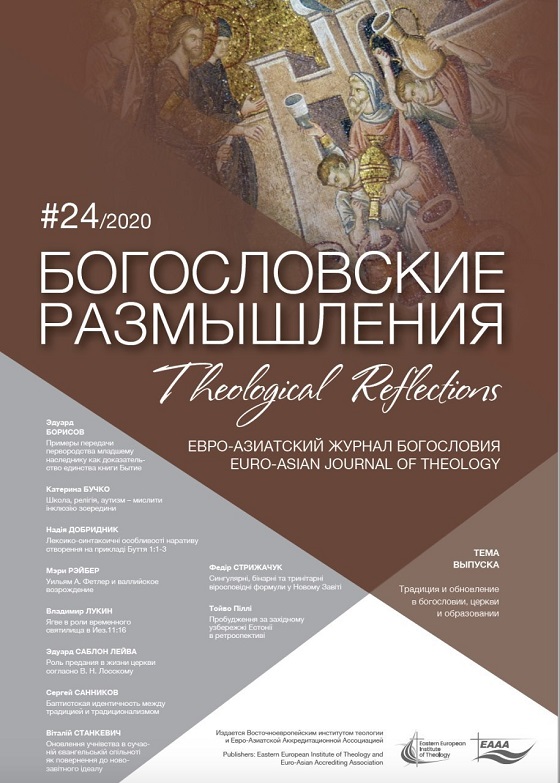SCHOOL, RELIGION AND AUTISM: UNDERSTANDING INCLUSION FROM WITHIN
DOI:
https://doi.org/10.29357/2521-179X.2020.24.2Keywords:
(religious) education, inclusion, diversity, school and school development, index for inclusion, autism, persons with autism.Abstract
Annotation: This article presents inclusion paradigm in theory and school practice and attempts to exhibit its importance in education, its value as communication and as dynamic process. Based on the key point of inclusion – diversity – inclusive pedagogy is aimed to serve a diverse group of pupils. Theoretical clarification follows the concept of “egalitarian difference” (Prengel) and ability to accept and to respect difference. Inclusion in education presuppose a change of perspective – especially in the ways of “label thinking” or “deficit thinking”, in contribution of both teacher and student to the learning process. One of the main instruments of inclusion is Index for inclusion (Booth/Ainscow) – a practical tool widely used in schools, which contains many questions to each of three dimensions (inclusive cultures/structures/practices) in order to support school development. School development in the horizon of culture of recognition (Jäggle) means to see diversity as a recourse, not as a problem, and school development processes as development of democracy. Learning communities of pupils are also “spiritual communities” (SLC), since learning occurs always “in the presence of the other” (Roebben). As next steps this understanding of inclusion as communication is applied on an example of autism – what does this means for those, who have the biggest problems in communication and social interaction.
References
- Bibliography
- Booth, Tony, and Ainscow, Mel. Index for Inclusion. Developing learning and participation in schools. Bristol CSIE 2000, 2002. Adopted german version: Boban, Ines, and Hinz, Andreas, Index für Inklusion. Lernen und Teilhabe in der Schule der Vielfalt entwickeln. Verlag Martin Luther Halle Universität Wittemberg, Fachbereich Erziehungs-wissenschaften, 2003. http://www.csie.org.uk/resources/translations/IndexGerman.pdf.
- Down Syndrom Education International https://www.dseinternational.org/en-us/education21/6/. (Accessed: 26.02.2020).
- Ecumenical Initiative lebens.werte.schule https://lebenswerteschule.univie.ac.at/.(Accessed: 26.02.2020).
- Eckert, Andreas. ‘Gelingende schulische Förderung. Zwischen Inklusion und Separation’. In Autismus in Forschung und Gesellschaft, edited by Autismus Deutschland e. V. Bundesverband zur Förderung von Menschen mit Autismus. Karslruhe, von Loeper Literaturverlag, 2014.
- Grandin, Temple, and Panek, Richard. The Autistic Brain. Exploring the Strength of a Different Kind of Mind. United Kingdom: Rider books, 2014.
- Gruber, Karolin. ‘Autismus’. In Handbuch Inklusion und Sonderpädagogik, edited by Ingeborg Hedderich, Biewer, Gottfried et.al. Bad Heilbrunn: Verlag Julius Klinkhardt, 2016.
- Hattie Studie, Projekt „Visible Learning“ http://visible-learning.org/de/. (Accessed: 27.02.2020).
- Hart, Susan, Drummond, Mary Jane, and McIntyre, Donald. ‘Learning without limits. Constructing a pedagogy free from determinist beliefs about ability’. In The SAGE
- handbook of special education. Edited by Lani, Florian. London: SAGE Publications, 2007.
- Hetzel, Mechthild. ‘Über Beschreibung und Klassifikation hinaus: Zum Verhältnis von Theorie und Praxis in empirischer Inklusionsforschung’. Zeitschrift für Inklusion, no.1 (2013), https://www.inklusion-online.net/index.php/inklusion-online/article/view/24.
- Jäggle, Martin, and Krobath, Thomas. ‘Schulentwicklung für eine Kultur der Anerkennung. pädagogische, organisationsethische und religionspädagogische Akzente’. In lebens.werte.schule. Religiöse Dimensionen in Schulkultur und Schulentwicklung, edited by Jäggle, Martin, Krobath, Thomas, and Schelander, Robert. Wien: LIT Verlag, 2009.
- Jäggle, Martin. „Aufgabe des Religionsunterrichts heute in Europa“. Universität Wien, 2005. www.siesc.eu/de/2005/sbg2005/jaeggle.doc. (Accessed: 27.02.2020).
- Jerg, Jo. ‘Der Index für Inklusion als Instrument zur Gestaltung von Inklusionsprozessen’. In Inklusion. Lehr- und Arbeitsbuch für professionelles Handeln in Kirche und Gesellschaft, edited by Ulf Liedke, Harald Wagner et.al. Verlag W.Kohlhammer, 2016.
- Kamp-Becker, Inge, and Bölte, Sven. Autismus, 2. Edition, München: UTB, 2014.
- Liedke, Ulf, and Wagner, Harald. ‘Inklusionen: Sozialwissenschaftliche Grundlagen für eine Praxistheorie der Teilhabe und Vielfalt’. In Inklusion. Lehr- und Arbeitsbuch für
- professionelles Handeln in Kirche und Gesellschaft, edited by Ulf Liedke, Harald Wagner et.al. Verlag W. Kohlhammer, 2016.
- Liedke, Ulf. ‘„Offen für alle“ Grundlagen und Arbeitsformen inklusiver Praxis in Kirchengemeinden’. In Inklusion. Lehr- und Arbeitsbuch für professionelles Handeln in Kirche und Gesellschaft, edited by Ulf Liedke, Harald Wagner et.al. Verlag W. Kohlhammer, 2016.
- Noterdaeme, Michel. ‘Wie früh lässt sich Autismus wirklich erkennen und diagnostizieren?’ In Autismus in Forschung und Gesellschaft, edited by Autismus Deutschland
- e.V. Bundesverband zur Förderung von Menschen mit Autismus. Karlsruhe: von Loeper Literaturverlag, 2014.
- Prengel, Annedore. Pädagogik der Vielfalt: Verschiedenheit und Gleichberechtigung in Interkultureller, Feministischer und Integrativer Pädagogik, 3. Auflage. Wiesbaden: Springer
- VS, 2006.
- Prengel, Annedore, and Heinzel, Friederike. ‘Anerkennungs- und Missachtungsrituale in schulischen Geschlechterverhältnissen’. ZfE Zeitschrift für Erziehungswissenschaft 7, Beiheft 2 (2004). Innovation und Ritual. Leverkusen, ed. Wulf, Christof, and Jörg, Zirfas, 115-128.
- Roebben, Bert. ‘Einander in Fremdheit begleiten. Möglichkeiten und Grenzen einer Spiritual Learning Community’. In Anerkennung in religiösen Bildungsprozessen: interdisziplinäre Perspektiven. Diskursschrift für Martin Jäggle. Göttingen: Vienna UnivPress by V&R Unipress, 2013.
- Williams, David, Bowler, Dermont, and Jarrold, Christopher. ‘Inner speech is used to mediate short-term memory, but not planning, among intellectually high-functioning adults with autism spectrum disorder’. In Development and Psychopathology 24, no.1, (2012): 225- 239. doi: 10.1017/S0954579411000794.
- Zimpel, André Frank. ‘Inklusion mit Rückzugsmöglichkeiten – Schwierigkeiten und Chancen schulischer Inklusion bei Autismus’, Autismus. Das besondere Thema – Schulische Inklusion. Ed. Autismus Deutschland e.V., no. 76 (October 2013): 6-16.
- Shved, Marija. Osnovy inkluzyvnoji osvity. Lviv: Vydavnytstvo Ukrajinskoho Katolytskoho Universytetu, 2015.
- UN in Ukraine http://www.un.org.ua/ua/tsili-rozvytku-tysiacholittia/tsili-stalohorozvytku. (Accessed: 26.02.2020).
Downloads
How to Cite
Issue
Section
License
Copyright (c) 2020 Kateryna BUCHKO

This work is licensed under a Creative Commons Attribution-NonCommercial 4.0 International License.
All articles published in the Journal are distributed under a Creative Commons Attribution-NonCommercial 4.0 International License
By submitting an article for publication in Theological Reflections: Eastern European Journal of Theology the author grants the editors the right to publish the article and distribute it in electronic and print form.
The author reserves all copyrights and the right to use the materials of the article in whole or in part for educational purposes, to write his own dissertations, to prepare abstracts, conference reports, oral presentations, etc., as well as post electronic copies of articles (including the final electronic version downloaded from the journal’s official website) on non-commercial web-resources without the consent of the editorial board and founders.



